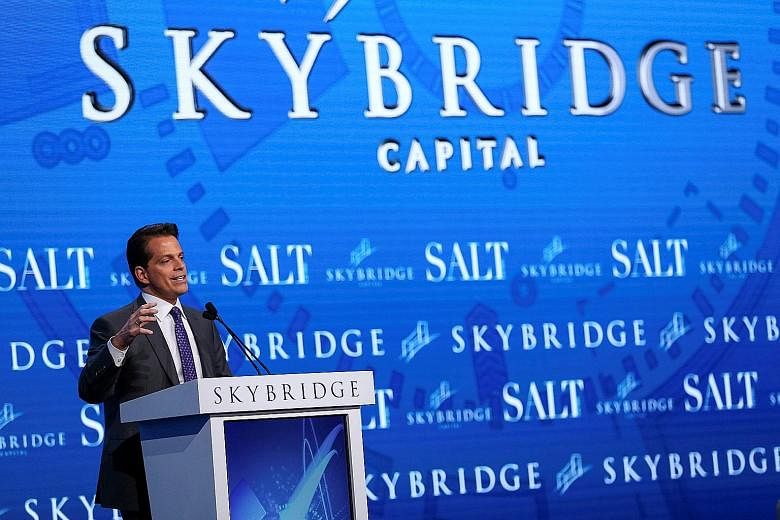WASHINGTON • Just over a year ago, two senior executives from giant Chinese conglomerate HNA landed a meeting with US Treasury Secretary Steven Mnuchin at his office.
The executives, Mr Adam Tan and Mr Guang Yang, snapped a photo with Mr Mnuchin, holding a model plane of the HNA-owned carrier, Hainan Airlines.
Officially, they wanted to discuss the state of the US economy. But HNA had other urgent business: It was trying to buy the New York investment firm, SkyBridge Capital.
The deal had been languishing for months while the Treasury Department and other agencies reviewed it for potential national security concerns. Other acquisitions, too, were on hold, putting pressure on a spending spree that had turned HNA into a global behemoth with US$100 billion (S$137 billion) in annual revenue and stakes in Hilton Hotels, Swissport and Ingram Micro.
HNA executives were eager to complete the deal, as was SkyBridge's co-founder, Mr Anthony Scaramucci, who was hoping to be appointed to a White House post.
They held a second meeting, in June last year, with Treasury officials involved in the SkyBridge review by the highly secretive, multi-agency board, the Committee on Foreign Investment in the United States (CFIUS).
The meetings were part of a major campaign by HNA to win over Washington power brokers. It hired leading lobbying firms like McLarty Associates. It bought splashy advertisements to position HNA as an emerging global brand and a good corporate citizen.
Top executives visited Capitol Hill, and in February, one met President Donald Trump at the Trump International Golf Club, near his Mar-a-Lago estate in Florida.
But in late April, HNA scrapped its bid for SkyBridge Capital. Both companies realised that they would not get the green light from regulators.
Chinese companies, once among the most prolific deal-makers in the world, are increasingly running into regulatory roadblocks, particularly in the US. A slew of deals by Chinese buyers have been thwarted for national security reasons, including the acquisition of MoneyGram by Ant Financial, the electronic payments company controlled by Internet tycoon Jack Ma.
Regulators will soon be more emboldened. Congress has just passed new rules on foreign takeovers of US companies, to strengthen the national security reviews and give more authority to CFIUS. Mr Trump is expected to sign them into law.
HNA, in many ways, has embodied China's global vision. In recent years, company executives jetted around the world, investing overseas in airports, shipping lines, office towers and international logistics operations.
The company had longstanding ties to leaders in both China and the US. Its executives have struck business deals with former governor Jeb Bush of Florida as well as the family of former Chinese prime minister Wen Jiabao, according to records obtained by The New York Times.
But global regulators started to ask questions about its debt-fuelled buying binge, as well as its ownership structure. Like other large Chinese conglomerates, HNA is a vast network of public and private companies, subsidiaries and affiliates under a single corporate umbrella. In the US, regulators asked HNA about its links to the Chinese government, according to court documents.
"The problem with HNA is not that they're a Chinese company. It's about transparency," said Mr Derek Scissors, a scholar at the American Enterprise Institute in Washington. "They say, 'Who is HNA?' No one knows who owns this company."
Regulators in Switzerland said HNA had given "untrue" information about its ownership structure when it sought approval for a takeover of Gategroup, a Swiss catering firm. Several deals were in limbo as HNA waited for approval from US regulators. In addition to SkyBridge, HNA had agreed to buy a division of Ness Technologies, a New Jersey software firm, for US$325 million early last year.
Regulators reviewing the Ness and SkyBridge deals for national security purposes wanted more information about HNA's ownership. But they began discovering discrepancies in documents that the company had submitted about its corporate structure and ownership.
By early spring, it was clear HNA's deal for SkyBridge was doomed. Two other HNA deals had failed to win CFIUS approval. And in Washington, the mood towards Chinese investment was souring, as trade tensions mounted.
Mr Scaramucci said that in March, the two firms agreed to cancel the SkyBridge acquisition. Instead, they decided to create a joint venture that might seek new opportunities in China.
NYTIMES

